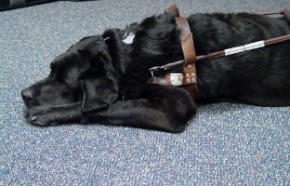Good dog, bad dog
This year our seminary community includes two adorable black Labrador retrievers. They are guide dogs that quietly and tirelessly help students with vision disabilities navigate our curbs, steps, and a busy road that runs through campus. They go with the students to classes, the cafeteria, the library—and sometimes they roll over to scratch their backs on the grassy quad as their students sit talking with others.
The dogs also come to chapel and lie down next to each other under the first pew. They’re long-legged, so they sprawl out a bit in front of the pew. Interestingly, they always face the pulpit.
I preach in this chapel every Monday. I’m very grateful that the dogs make it possible for two of our students to attend seminary and participate in the full life of our community. But it’s an interesting experience to look down from the pulpit, halfway through the sermon’s best sentence that was oh so carefully constructed, and see a couple of tired dogs looking up at me.





